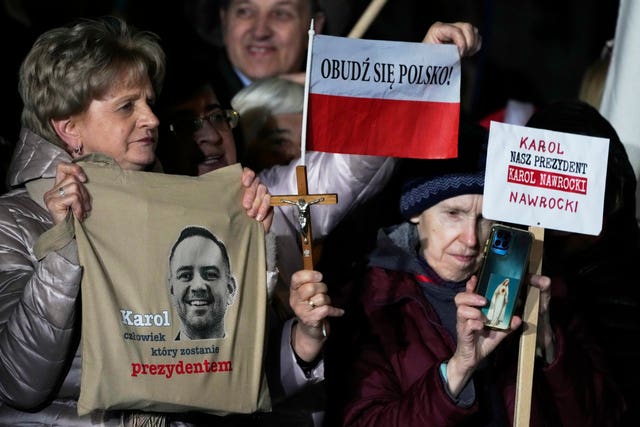Poles vote for a new president as security concerns loom large
The two frontrunners are Warsaw mayor Rafal Trzaskowski and Karol Nawrocki, a historian with no prior political experience.

Poles are voting on Sunday in a presidential election at a time of heightened security concerns, stemming from the ongoing war in neighbouring Ukraine and growing worry that the US commitment to Europe’s security could be weakening under US President Donald Trump.
The two frontrunners are Warsaw mayor Rafal Trzaskowski, a liberal allied with Prime Minister Donald Tusk, and Karol Nawrocki, a conservative historian with no prior political experience who is supported by the national conservative Law and Justice party.
Recent opinion polls show Mr Trzaskowski with about 30% support and Mr Nawrocki in the mid-20s. A second round between the two is widely expected to take place on June 1.
The election is also a test of the strength of other forces, including the far right.

Slawomir Mentzen, a hard-right candidate who blends populist rhetoric with libertarian economics and a critical stance towards the European Union, has been polling in third place.
Ten other candidates are also on the ballot. With such a crowded field and a requirement that a candidate receive more than 50% of the vote to win outright, a second round seemed all but inevitable.
Polling stations opened at 7am and close at 9pm. Exit polls will be released when voting ends, with results expected by Tuesday, possibly Monday.
Polish authorities have reported attempts at foreign interference during the campaign, including denial-of-service attacks targeting parties in Mr Tusk’s coalition on Friday and allegations by a state research institute that political ads on Facebook were funded from abroad.
Although Poland’s prime minister and parliament hold primary authority over domestic policy, the presidency carries substantial power.
The president serves as commander of the armed forces, plays a role in foreign and security policy, and can veto legislation.
The conservative outgoing president, Andrzej Duda, has repeatedly used that power over more than the past year to hamper Mr Tusk’s agenda, for example blocking ambassadorial nominations and using his veto power to resist reversing judicial and media changes made during Law and Justice’s time in power from 2015 to late 2023.
A Trzaskowski victory could be expected to end such a standoff.
He has pledged to support reforms to the courts and public media, both of which critics say were politicised under Law and Justice.
Mr Tusk’s opponents say he has also politicised public media.
Mr Nawrocki, who leads a state historical institute, has positioned himself as a defender of conservative values and national sovereignty.





